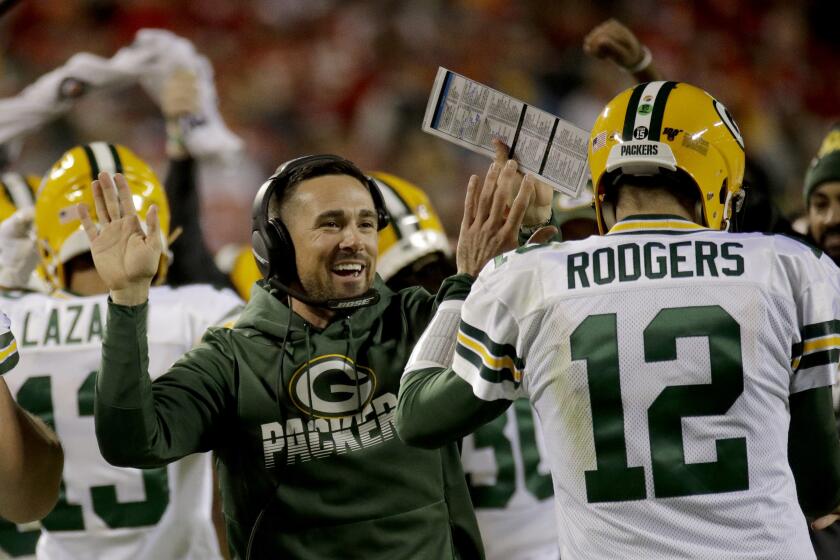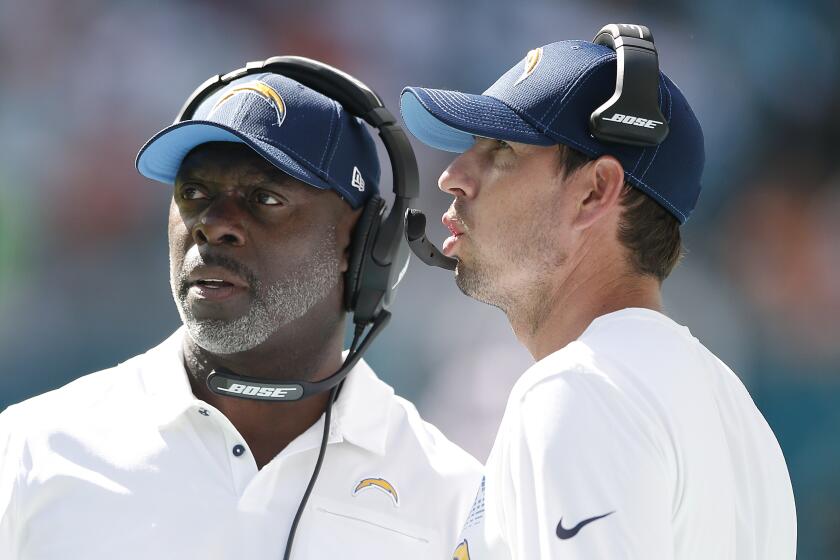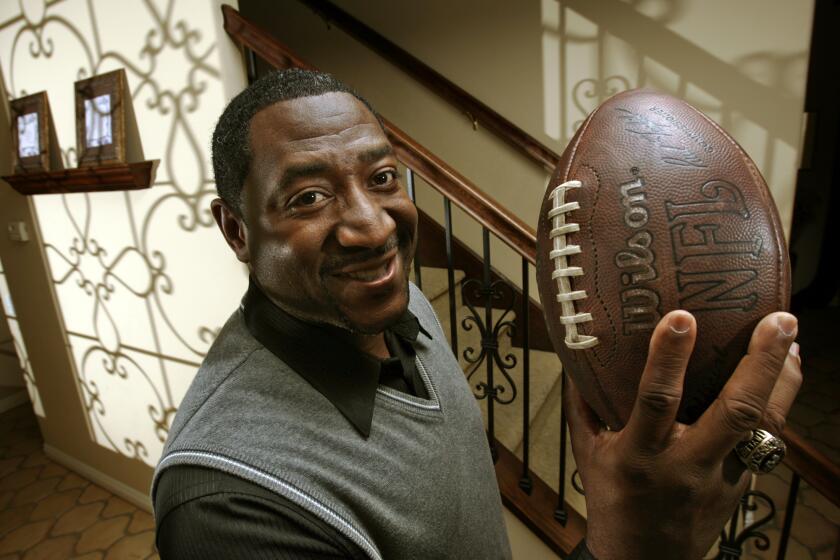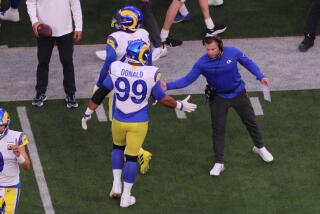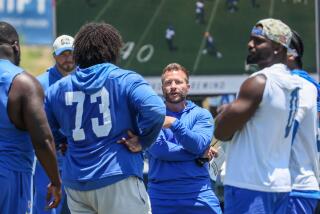Ask Sam Farmer: Why do NFL teams risk key players’ health in blowouts?
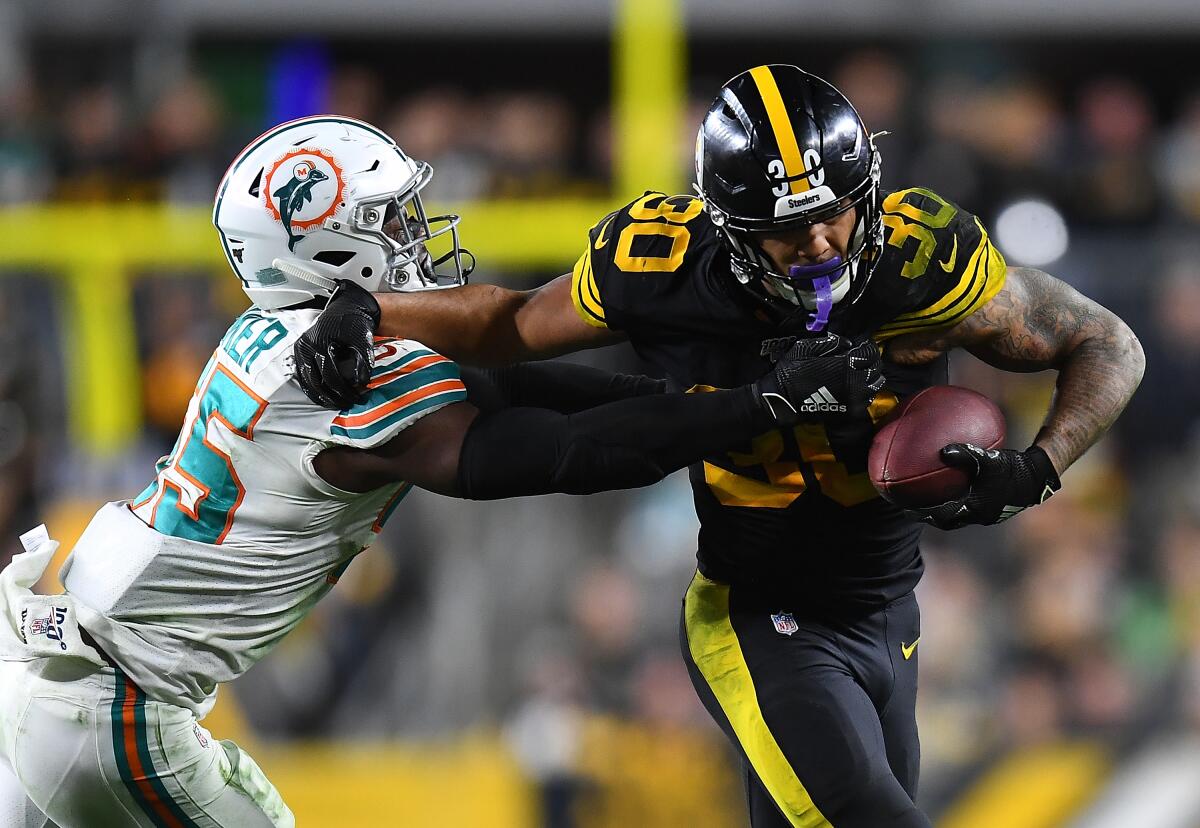
- Share via
Have a question about the NFL? Ask Times NFL writer Sam Farmer, and he will answer as many as he can online and in the Sunday editions of the newspaper throughout the season. Email questions to: sam.farmer@latimes.com
Can you help me understand the seeming inconsistency about when coaches rest their star players? In the entire preseason, we might see a certain starter for a series or two and in Week 17 with a playoff berth wrapped up, most starters will sit. But during the season, with the outcome of the game clear, coaches will put their best players at risk by leaving them in the game sometime with disastrous outcomes such as when Rob Gronkowski broke his arm playing in a game that had four minutes left and his team up by 35 points. I understand that coaches don’t want to risk the one-in-a-million comeback, but with analytics driving so many personnel and play-calling decisions today, why wouldn’t the same use of statistical probability of a comeback and analytics lead a coach to pull his most valuable talent when essentially only bad things could happen to the player?
Thomas James, Los Angeles
Farmer: That’s a terrific question, and here’s an even more recent example: Pittsburgh running back James Conner suffered a shoulder injury in garbage time of Monday night’s 27-14 victory over Miami. He could (should?) have been safely on the sideline at that point. The benefits of pulling top-shelf players in games that have long since been decided goes beyond protecting those players. You’re getting real-game experience for their backups, experience they can draw on if their number is called later in the season.
What’s more, as the NFL inches closer to fully guaranteed contracts, the reasons for resting starters become even more compelling. It will no longer be as important to those players to collect playing-time bonuses and the like. They will be guaranteed their money either way.
Most of the eight first-year coaches have had their difficulties this season, except for the Packers’ Matt LaFleu,r who has had a franchise best 7-1 start.
For more insight on how teams think in regards to this, I turned to Hall of Fame quarterback Troy Aikman. He said there were times during his Dallas Cowboys career when he would have been OK with handing the keys to his backup and resting for the next game.
“It’s a really good question, and I don’t have an answer for it,” said Aikman, a Fox analyst. “There’s been some games that we’ve done where they’re pretty much over, yet we see guys still out there playing. I’ve asked the question. It used to be kind of the norm, if a team was way behind or up by a lot, they’d put someone else in — and not just at quarterback but other spots too. It just doesn’t seem to happen as much.
“Now, we’ve had games where teams were down 21 points, and in the blink of an eye they’re right back in it. I’ve learned that these deficits are not insurmountable. A lot can happen. I think that enough coaches have seen that, that they just don’t want to fall victim to it. I think they’re overly cautious.
“Back in Dallas, I would come out if we were way up. I wasn’t upset. I wouldn’t have been as thrilled if we were losing. But with a lead, I wouldn’t have minded that.”
The Chargers’ rushing attack has been historically woeful the last month and the assignment to improve falls on new offensive coordinator Shane Steichen.
Then he told a cautionary tale.
“There was a game in Week 2, where we played the New York Giants at their place, and we were up 28-0 at halftime, and Phil Simms was their quarterback,” he said. “We scored a touchdown on the opening drive of the third quarter and we were up 34-0. Jimmy Johnson pulled all of the starters. The Giants climbed back, and the starters had to go back in the game with us up 34-21. We barely got out of there with a 34-28 victory.”
I also asked Rams coach Sean McVay, who’s a big proponent of resting starters in the preseason and at the end of the year when his team’s playoff position is locked.
“Naturally, you want to try to win the game, and you want to make sure, where that comfortable spot is that you feel good about trying some guys that wouldn’t be in otherwise,” McVay said.
“And then the other element that really comes into play is you just have 46 available guys on your active roster on game day. For us over the last couple of years, when you’ve got seven offensive linemen active, sometimes that can present a challenge. …
Kitrick Taylor no longer has the football, but he clings tightly to the memory of the Sunday he helped lift the curtain on an unforgettable NFL era.
“Like a couple weekends ago in Atlanta, I wanted to get [backup quarterback Blake] Bortles in, and get Jared [Goff] out, but we were pretty much exclusively running the football just to see how quickly we could get the clock to run out. We weren’t leaving ourselves susceptible to some of the things where a quarterback can get hurt, throwing it and things of that nature.
“Usually, those are conversations we have as a coaching staff on the headset. Typically it’s, ‘Let’s see how quickly we can run the clock out, and get out of here with a win.’ ”
More to Read
Go beyond the scoreboard
Get the latest on L.A.'s teams in the daily Sports Report newsletter.
You may occasionally receive promotional content from the Los Angeles Times.

